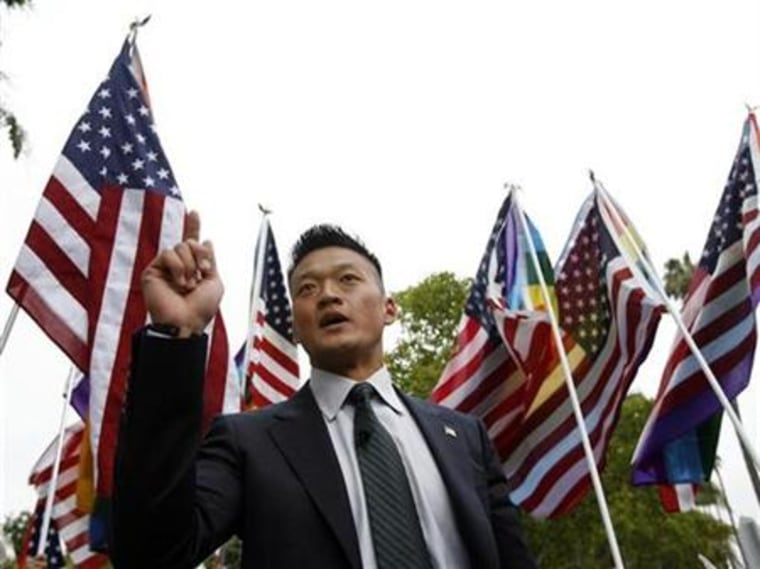A federal judge formally refused on Tuesday to let the Pentagon reinstate its ban on openly gay men and women in the U.S. military while it appeals her decision declaring its "don't ask, don't tell" policy unconstitutional.
A day after tentatively siding against the Obama administration, U.S. District Judge Virginia Phillips issued a written decision denying a government request to lift her own injunction barring further Pentagon enforcement of the ban.
Although government concerns about military readiness and cohesion are important, "these interests are outweighed by the compelling public interest of safeguarding fundamental constitutional rights," she wrote in a six-page opinion.
President Barack Obama has insisted he stands by his 2008 campaign pledge to end "don't ask, don't tell," but his administration had urged the judge to allow more time for a political remedy to the issue rather than a court-imposed one.
The Pentagon also has argued that an abrupt change in the 17-year-old policy, enacted into law under then-President Bill Clinton, would hamper the military.
But anticipating an unfavorable ruling on Tuesday, the Defense Department has instructed its recruiters for the first time to start accepting applications from enlistees who acknowledge they are gay.
Nevertheless, the administration has served notice that it would take its case to the 9th U.S. Circuit Court of Appeals and seek to block Phillips' order there if she denied a stay.
Following Phillips' decision last week striking down "don't ask, don't tell," the Pentagon on Tuesday made clear that it had told recruiters they must accept gay applicants.
The opening, first spelled out last Friday, was seized by gay rights advocates like Iraq war vet Dan Choi, who showed up Tuesday at a recruiting station in New York City's Times Square.
"In the recruiting station," Choi said in a Twitter posting. "Apparently I'm too old for the Marines! Just filled out the Army application."
Choi, a lieutenant and Iraq combat veteran, was discharged under "don't ask, don't tell" when he came out as being gay in late 2008.
While activists were going to enlist, gay rights groups were continuing to tell service members to avoid revealing that they are gay, fearing they could find themselves in trouble should the law be reinstated.
Douglas Smith, spokesman for U.S. Army Recruiting Command, said even before the ruling that recruiters did not ask applicants about their sexual orientation. The difference now is that recruiters will process those who say they are gay.
"If they were to self-admit that they are gay and want to enlist, we will process them for enlistment, but will tell them that the legal situation could change," Smith said.
He said the enlistment process takes time and recruiters have been told to inform those who are openly gay that they could be declared ineligible if the law is upheld on appeal.
"U.S. Army Recruiting Command is going to follow the law, whatever the law is," he said.
Earlier Tuesday, Pentagon spokeswoman Cynthia Smith told reporters that top-level guidance has been issued to recruiting commands informing them that the "don't ask, don't tell" rule has been suspended for now.
Recruiters also have been told to inform potential recruits that the moratorium could be reversed at any point.
Phillips, who was appointed to the federal bench by Clinton, ruled in September that the policy he introduced in 1993 infringes on the constitutional free-speech and due-process rights of gay men and lesbians in uniform.
She put that opinion into effect on Oct. 12 with a blanket injunction requiring the military to stop enforcing the ban and drop pending investigations and discharges stemming from it.
"Don't ask, don't tell" was enacted as a compromise between previous regulations that had long excluded gays from the armed forces altogether and Clinton's original promise to open the military to gays and lesbians outright.
The new law prohibited commanders from asking service members or recruits about their sexual orientation but subjected troops to expulsion if homosexual behavior on their part was revealed or volunteered.
In a separate case last month, a federal judge in Tacoma, Washington, ordered the reinstatement of a former U.S. Air Force Reserve flight nurse who was discharged from the military after revealing she is a lesbian.
The lawsuit challenging the policy was brought by the Log Cabin Republicans, a gay rights group, six years ago.
Clarke Cooper, executive director of Log Cabin Republicans, welcomed the decision.
"Judge Phillips is right to stand with servicemembers by rejecting President Obama's request to continue this discriminatory policy," he said in a statement. "It is vital that as a nation we uphold the fundamental constitutional rights of all soldiers, sailors, airmen, marines and coast guardsmen.
